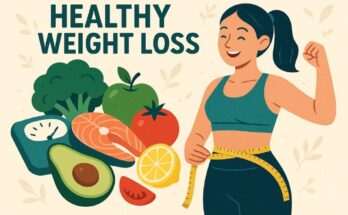How Exercise Helps Weight Loss
Introduction
Helps Weight Loss Several people try to lose weight to reach a healthy lifestyle. Although diet plays an important role, exercise is basically as essential. Exercise keeps burning calories, boosts metabolism, refines muscle tone, and enhances general well-being. This article presents some avenues through which exercise aids weight loss while emphasizing the importance of incorporating exercise into one’s daily regimen.
Understanding Weight Loss
Weight loss occurs when your body burns more calories than it consumes. This is a deficit of its caloric intake. Some energy is used to keep body functions like respiration, digestion, and circulation. Your body will begin to tap into stored fat for energy when more calories are burned than consumed, and this causes weight loss. (Helps Weight Loss)

How Exercise Aids in Reducing Weight
1. Keeps the body in a caloric deficit
Possibly one of the most important benefits of exercise is its role in burning calories. Different types of exercise burn calories at different rates. For instance, running or HIIT uses more calories a minute compared to walking or yoga. Thus, with more intensity, offers more weight loss through the greater number of calories burnt. ( Helps Weight Loss )
2. Increases Metabolism
Exercise provides a spike in metabolism, which is basically the rate at which the body burns calories. Strength training and resistance exercises build muscle mass. Since muscle burns more calories than fat, the person’s muscle mass boost will elevate resting metabolic rate, enhancing the continuation of calorie burning while the body is resting. (Helps Weight Loss)
3. Encourages Fat Loss While Preserving Muscle Mass
Weight loss through diet alone often comes with the cost of muscle loss. Exercise, particularly strength training, ensures a reduction in fat without the loss of lean muscle mass in this case, which is essential in maintaining a healthy body composition and preventing metabolic slowdown.
4. Enhances Hormonal Balance
Exercise has an effect on hormone levels that contribute significantly to weight management. Exercise stimulates the production of hormones like adrenaline and norepinephrine, making the fat stores easier to mobilize and burn. And exercise keeps insulin at the required level, reducing fat accumulation and the risk of diseases associated with obesity.

5. Appetite Suppression and Cravings Control
Exercise does not elevate appetite as commonly believed; rather, various studies show that intense activity brings about suppression of the appetite. Intense exercise potentially elevates hormones associated with increased satiety, such as peptide YY (PYY), inhibiting the production of hunger hormones when ghrelin kicks in. Exercise also helps reduce cravings for unhealthy junk foods high in calories since it boosts the mood and reduces eating in response to stress.
6. Promotes Mental Health and Relieves Stress
Stress and emotional eating are widely regarded as causes of weight gain. Endorphins also known as feel-good hormones released during exercise can enhance mood and relieve stress. While controlling levels of stress hormones through exercise, individuals may avoid binge eating or poor food choices, which can lead to weight gain.
7. More Energy and Stamina
With regular workouts, a person achieves high endurance and energy levels and can remain active throughout the day. Fitness enthusiasts are more likely to engage in any random activity during the day, which burns some extra calories through an easy walk, climbing multiple flight of stairs, performing odd jobs at home; this is effortlessly done, and works for Helps Weight Loss .
8. Quality of Sleep
Weight gain is directly proportional to poor sleep, as a consequence of hormonal imbalance in a person, sometimes causing enhanced appetite, cravings, and trigger window of Helps Weight Loss . Exercise improves sleep through relief and reduction of stress that are basic ones aggravated more by exercises. This, in turn, nurtures weight loss by holding the subtlety of high hormonal levels and distracting the craving to binge after dark.

read more https://venombil.com/what-are-the-best-foods-for-weight-loss/
Best Kinds of Exercise for Weight Loss
Differences in exercises manifest their role in weight loss in distinct realms. Orchestrating numerous modalities can mean smashing results.
- Cardio
Cardio workouts include running, cycling, swimming brisk walk, etc., and kick the heart highly, thus burning a lot of calories. They are best recommended for shedding extra pounds in weight-control and cardiovascular fitness programs.
- Resistance Training
Resistance training comprises weightlifting and resistance workouts, which help keep the muscle and raise metabolism. The greater the muscle mass, the more calories a person burns, even at rest, thus making dieting far freer; hence, a person can afford to eat now and again, as they increase muscle metabolism and usually do not pile up.

- High-intensity interval training (HIIT)
HIIT is based on short bursts of high-intensity workout followed by brief rest periods. HIIT-style of exercise is very effective in burning fat, improving endurance, and raising the metabolism for hours after exercise.
- Yoga and Pilates
Though not as calorie-burning as cardio or HIIT, yoga and Pilates do such a good job at improving flexibility, helping ease stress, and supporting mental wellness that they can only help with sustainable weight loss.
- Walking and Daily Activities
This encourages movement throughout the day-walking, climbing stairs, and engaging in active hobbies, all contributing to accumulated calories burned and weight loss over time.
Creating an Effective Exercise Plan
With sustainable weight loss, one must have appropriate exercise guidelines. Effective workout measures:
- Setting Achievable Goals: Starting small with achievable goals will ensure progression toward your desired target.
- Mixing It Up: Ensuring you have a balance of cardiovascular, strength training, and flexibility workouts will provide a well-rounded workout regime.
- Being Consistent: An ideal workout regime would be to exercise regularly, preferably for 150-300 minutes per week, for lasting effects.
- Practicing with Healthy Eating: Exercise is not enough; nutritious diets must be eaten in order to ensure caloric deficits.
- What the body wants: Considerable attention must be paid so as to avoid overexertion. Your rest is as important.
- Drinking, Drunk: Provides proper metabolism and energy level for workouts and workouts.

Conclusion
Exercise is an effective medicine for weight loss and much more than merely burning calories. It stimulates metabolism, prevents muscle loss, balances hormones, combats stress, and generates well-being. A combination of aerobic, strength, and flexibility exercises performed on a regular basis facilitates the individual’s control over his or her body weight and allows for easier weight maintenance. Helps Weight Loss Exercise associated with good nutrition and lifestyle modifications facilitates ongoing weight loss with substantial long-term health benefits. Ultimately, consistency and commitment to an exercise lifestyle ensure success in any weighting down journey. (Helps Weight Loss)
read morehttps://www.nhs.uk/live-well/healthy-weight/managing-your-weight/tips-to-help-you-lose-weight/





